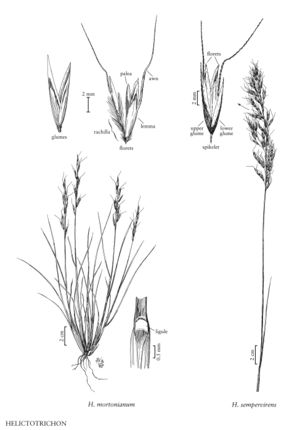familyPoaceae
subfamilyPoaceae subfam. Pooideae
tribePoaceae tribe Poeae
genusHelictotrichon
speciesHelictotrichon sempervirens
Difference between revisions of "Helictotrichon sempervirens"
Common names: Blue oatgrass
Synonyms: Avena striata
Treatment appears in FNA Volume 24. Treatment on page 701.
FNA>Volume Importer |
imported>Volume Importer |
||
| Line 41: | Line 41: | ||
|publication year= | |publication year= | ||
|special status= | |special status= | ||
| − | |source xml=https:// | + | |source xml=https://bibilujan@bitbucket.org/aafc-mbb/fna-data-curation.git/src/bb6b7e3a7de7d3b7888a1ad48c7fd8f5c722d8d6/coarse_grained_fna_xml/V24/V24_994.xml |
|subfamily=Poaceae subfam. Pooideae | |subfamily=Poaceae subfam. Pooideae | ||
|tribe=Poaceae tribe Poeae | |tribe=Poaceae tribe Poeae | ||
Revision as of 21:52, 27 May 2020
Culms 30-100(150) cm. Ligules 0.5-1.5 mm, truncate, ciliate; blades 15-60 cm long, 2-4 mm wide, usually convolute and 0.9-1.5 mm in diameter, glaucous, scabridulous, basal blades deciduous when dead. Panicles 8-20 cm; branches ascending, with 3-7(10) spikelets. Spikelets 10-14 mm, with 3(5) florets. Glumes subequal to unequal; lower glumes 7-10 mm; upper glumes 10-12 mm; lowest lemmas 7-12 mm, awns about 15 mm; distal lemmas unawned; anthers about 5 mm. 2n = 28, 42.
Discussion
Helictotrichon sempervirens is a native of the southwestern Alps in Europe, where it grows on rocky soils and in stony pastures. In the Flora region, it is frequently grown as an ornamental species; it is not established in the region.
Selected References
None.
Lower Taxa
None.
